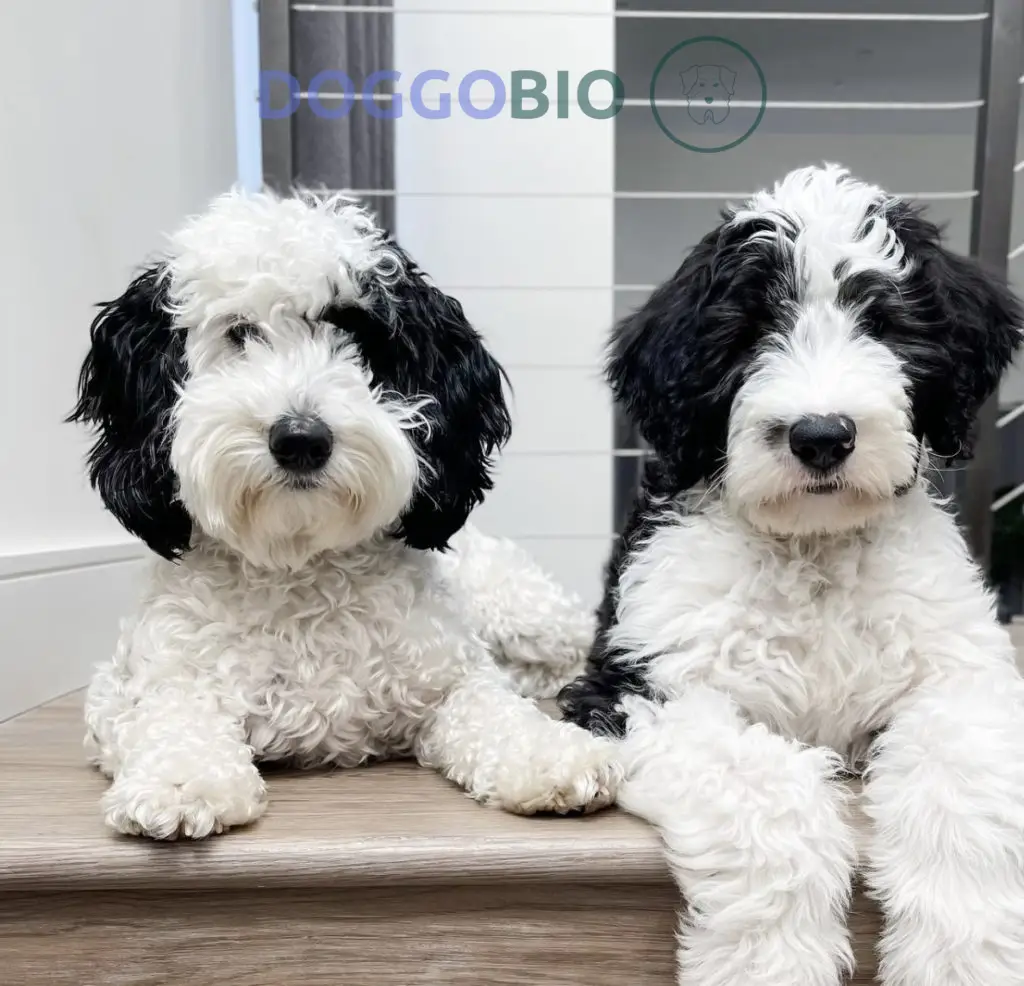The world of designer dog breeds has witnessed a remarkable addition that has captured the hearts of many pet enthusiasts – the F1B Bernedoodle. A delightful blend of the Bernese Mountain Dog and Poodle, this hybrid pup embodies the best qualities of its parent breeds, resulting in an irresistibly intelligent, affectionate, and charming companion.
This article will explore their fascinating characteristics, unique appearance, and loving personalities, making them cherished family companions. Discover why this hybrid breed continues to capture the hearts of dog lovers worldwide.
A Brief Overview of F1b Bernedoodle
| Size | 24 to 30 inches (60.96cm to 76.2cm). |
| Weight | 70 to 90 pounds (31.8kg to 40.8kg). |
| Temperament | Loyalty, intelligence, and playful mischievousness. |
| Activity Levels | High. |
| Exercise Requirements | 30 to 60 minutes. |
| Lifespan | 12 to 16 years. |
| Coat | They have a wavy or curly single coat, which is often low-shedding. Regular grooming is necessary to maintain their coat’s health. |
| Shedding | Low. |
| Good with Children | Yes. |
What is a Bernedoodle?

The Bernedoodle, a delightful mix of Bernese Mountain Dog and Standard Poodle, combines the best of both breeds. Affectionate and loyal, these pups are great family companions, known for their trainability. Plus, their low-shedding coats make them ideal for allergy sufferers.
With their charming personalities, Bernedoodles are sure to capture the hearts of dog lovers everywhere!
What is an F1b Bernedoodle?

An F1b Bernedoodle refers to the initial cross-back generation of this breed, resulting from pairing an F1 Bernedoodle with a purebred Poodle, available in toy, miniature, or standard sizes.
These charming dogs possess 25% Bernese Mountain Dog genes and 75% Poodle genes, making them a delightful blend of parent breeds.
Does F1b Bernedoodle Look More Like Poodle?
Yes, F1b Bernedoodles exhibit a stronger resemblance to Poodles, mainly because they inherit 75% of their genetic makeup from the Poodle lineage. This higher percentage of Poodle genes contributes to their leaner and taller stature than the standard Bernedoodle.
However, it’s essential to note that they retain several physical traits from Bernese Mountain Dogs, including a squarer face shape and their distinctive coloring. This blend of characteristics makes F1b Bernedoodles an enchanting mix of both parent breeds.
Bernedoodle Generations
1.F1b Bernedoodle Vs F1 Bernedoodle
The main difference lies in their genetic composition. F1 Bernedoodles are an even mix of 50% Poodle and 50% Bernese Mountain Dog, whereas F1b Bernedoodles boast a higher percentage of Poodle genes, precisely 75% Poodle and 25% Bernese Mountain Dog.
As a result, F1b Bernedoodles tend to showcase curlier, more hypoallergenic coats and often sport a leaner, taller physique, making them a sought-after choice for those who desire these desirable traits.
| Genetic Makeup | F1 Bernedoodle | F1b Bernedoodle |
| Parent Breeds | 50% Bernese Mountain Dog & 50% Poodle | 25% Bernese Mountain Dog & 75% Poodle |
2.F1b Bernedoodle Vs F2b Bernedoodle.
An F1b Bernedoodle represents the first backcross generation, resulting from crossing a first-generation F1 Bernedoodle with a purebred Poodle. On the other hand, the F2b Bernedoodle takes it a step further as the second backcross generation, achieved by breeding an F2 Bernedoodle with a purebred Poodle. Both F1b and F2b Bernedoodles share a genetic makeup of 75% Poodle and 25% Bernese Mountain Dog.
It’s essential to note that F2b Bernedoodles are often considered Multigen Bernedoodles, as they have undergone additional crossbreeding to enhance specific traits and characteristics. Each generation of Bernedoodles brings unique charm and appeal to families seeking these lovable companions.
| Genetic Makeup | F1b Bernedoodle | F2b Bernedoodle |
| Parent Breeds | 25% Bernese Mountain Dog & 75% Poodle | 25% Bernese Mountain Dog & 75% Poodle |
Is an F1b or F1 Bernedoodle better?

Determining whether an F1b or F1 Bernedoodle is superior is subjective. Many individuals consider F1b Bernedoodles preferable due to their heightened hypoallergenic qualities, making them a better choice for allergy sufferers. Moreover, those who favor Poodles over Bernese Mountain Dogs may also lean towards F1b Bernedoodles, as they exhibit more temperament and physical traits of the Poodle lineage.
Conversely, some people hold F1 Bernedoodles in higher regard, valuing their increased hybrid vigor and enhanced health benefits resulting from crossbreeding, especially compared to subsequent generations like F1b Bernedoodles.
Ultimately, the decision between these delightful Bernedoodle generations rests on individual preferences, lifestyles, and specific requirements.
What does an F1b Bernedoodle look like?
F1b Bernedoodles sport a curlier coat due to their higher Poodle genetics, setting them apart from F1 Bernedoodles. While they may resemble Poodles more than Bernese Mountain Dogs, the beauty of mixed breeds lies in their unpredictable appearance. Typically leaner and taller, they also exhibit a wider range of coat colors, diverging from the classic tri-color pattern associated with Bernese Mountain Dogs.
Size, height, and Weight
The size of a fully grown F1b Bernedoodle is influenced by the size of the Poodle bred with the Bernese Mountain Dog. F1b Bernedoodles can fall into three categories: miniature, medium, or standard sizes.
- F1b Mini Bernedoodles stand 19 to 23 inches tall and weigh 22 to 46 pounds.
- F1b Medium Bernedoodles reach 22 to 27 inches in height and weigh 23 to 47 pounds on average.
- F1b Standard Bernedoodles grow to 24 to 30 inches tall and weigh between 70 and 90 pounds.
Coat colors and Types
F1b Bernedoodles sport loose, flowing curls, while F1bb Bernedoodles have a more pronounced curly coat. Coat colors vary widely:
- F1b Tricolor: The classic black, white, and tan pattern.
- F1b Black and White: Solid black with striking white patches.
- F1b Black: Rare, requiring a double recessive gene.
- F1b Phantom: Two-toned, with a darker base color and lighter patches.
- F1b Merle: Mottled patches of colors, including Blue and Red Merle variations.
Temperament and Personality
Regarding character, F1b Bernedoodles showcase more of the Poodle’s distinctive traits, given that Poodle genes are dominant. These delightful companions are often praised for their loyalty, intelligence, mischievousness, and loving nature, making them an excellent addition to any family.
Unlike F1 or Reverse F1b/F1bb Bernedoodles, F1b Bernedoodles are less prone to stubbornness due to their lesser proportion of Bernese Mountain Dog genes. This characteristic makes them slightly easier to train, ensuring an enjoyable experience for the pup and their human family members.
Training and Exercise Requirements
Regarding training and exercise, the F1B Bernedoodle is a top-notch companion! Their high intelligence and eagerness to please make them quick learners, making training relatively easy and enjoyable. Whether it’s obedience or agility training, these clever pups tend to excel in various activities.
Given their active nature, the F1B Bernedoodle requires a good amount of exercise to keep them happy and healthy. They love to play and run, so having a backyard or access to a park is ideal for them to burn off that excess energy.
Grooming and Cleaning
Taking care of your lovable F1B Bernedoodle’s grooming and cleaning needs is essential for keeping them happy and healthy.
- Regular baths are recommended every 2 to 3 weeks to maintain their skin and coat in excellent condition. Use dog-specific shampoos to ensure their skin stays moisturized and looks fabulous.
- Brushing your furry friend’s teeth is crucial for their dental health. While daily brushing is ideal, we understand that busy schedules can sometimes make it challenging.
- And trimming your dog’s nails is a daunting task for both of you.
Although daily brushing might give the impression of shedding, F1B Bernedoodles are generally low to non-shedding dogs. However, regular brushing still helps to keep their coat in top shape and maintain a healthy, shiny appearance.
By giving your F1B Bernedoodle the proper grooming care and attention, you’ll ensure they always look and feel their best. It’s all part of being a responsible and loving dog owner!
| Grooming Need | Frequency |
| Hair Brushing | Daily |
| Bathing | Every 2-3 weeks |
| Ear Cleaning | Every 4 weeks |
| Tooth Cleaning | 2-3 times a week |
| Haircutting | Every 4-8 weeks |
| Nail Trimming | Every 1-2 weeks |
Food and Diet
Feeding your active and playful F1B Bernedoodle a healthy diet is crucial for their well-being. Opt for a high-protein and low-fat diet to meet their energy requirements and maintain excellent health. The specific amount of food they need will depend on their current weight and age.
To ensure you’re providing the best diet for your furry companion, it’s always a great idea to consult with your veterinarian. They can offer personalized advice and guidance, taking into account your dog’s unique needs and preferences.
Life Expectancy and Common Health Issues
Regarding the health of F1b Bernedoodles, it’s essential to be aware of specific considerations. These lovable pups have a more significant genetic diversity than first-generation mixes, which can be beneficial. However, like any breed, they can still be susceptible to hereditary health issues. To increase the odds of getting a healthy puppy, selecting a reputable breeder who conducts health tests on potential parent dogs before breeding is crucial.
Despite the dominating Poodle influence, F1b Bernedoodles remain relatively large dogs, and it’s vital to be mindful of potential problems such as:
- Canine bloat (gastric dilatation-volvulus)
- Hip and elbow dysplasia,
- Von Willebrand’s disease,
- Degenerative myelopathy,
- Cancer,
- Progressive retinal atrophy,
- Epilepsy,
- Addison’s disease,
- And thyroid issues.
Regarding their lifespan, F1b Bernedoodles’ longevity can vary based on their care, genetics, and potential health concerns. Standard Poodles tend to live around 12 years on average, while Bernese Mountain Dogs have a shorter average lifespan of 8 years. Smaller dogs generally have longer lifespans than larger ones, so F1b Bernedoodles typically outlive purebred Bernese Mountain Dogs.
With proper care, regular exercise, high-quality nutrition, and responsible breeding practices, F1b Bernedoodles can enjoy a fulfilling life into their double-digit years, with some even reaching their teens.
Consulting with a knowledgeable veterinarian is essential for the best advice on your F1b Bernedoodle’s health and overall well-being.
How Much is an F1b Bernedoodle?

The price of F1b Bernedoodles typically falls within the range of $2500USD to $6000USD. They are pricier than F1 Bernedoodles on average due to the longer breeding process involved.
Moreover, their heightened hypoallergenic qualities make them even more sought after, contributing to their higher cost.
Is a F1b Bernedoodle the Right Dog for You?
If you’re seeking a loyal, affectionate, and intelligent furry companion, the F1B Bernedoodle could perfectly match you! These delightful dogs are fantastic with kids and get along well with other pets, making them an excellent addition to any family.
Their trainability is a definite plus, making them easy to teach new tricks and commands. However, remember that they are active and need regular exercise to stay happy and healthy. Additionally, their coat requires some grooming effort to keep them in top shape.
If you’re ready to provide the love, care, and exercise that an F1B Bernedoodle thrives on, you’ll be rewarded with a devoted and cherished family companion.
List of dogs that are similar to F1 Bernedoodle
Frequently Asked Questions
Are F1b Smaller than F1 Bernedoodle?
No, F1b Bernedoodles are not smaller than F1 Bernedoodles. They tend to be taller than their F1 counterparts. Although they might appear lighter due to their leaner build, the added height usually places them within a similar weight range as F1 Bernedoodles.
So, while F1b Bernedoodles may stand taller, they maintain a comparable size to F1 Bernedoodles, debunking the notion that they are smaller.
How Long Can F1 B Bernedoodles Live?
F1b Bernedoodles typically enjoy a lifespan of 12 to 15 years.
They may live longer than F1 Bernedoodles because of their higher percentage of Poodle genes, and Poodles generally tend to have longer lifespans. Poodles typically live between 12 to 15 years, while Bernese Mountain Dogs have a shorter lifespan of 7 to 10 years.
The mix of Poodle genes in F1b Bernedoodles contributes to their extended life expectancy, making them delightful companions for many years.
Do F1b Bernedoodles Shed A Lot?
Nom F1b Bernedoodles are known for their light to non-shedding nature.
Thanks to their higher percentage of Poodle genes, they shed even less than F1 Bernedoodles. Breeders specifically create cross-back generations of Bernedoodles to achieve this reduced shedding trait, making them more hypoallergenic for sensitive individuals.
If you’re seeking a furry companion that minimizes shedding and offers a hypoallergenic experience, F1b Bernedoodles might be the perfect match for your home!
Are F1b Bernedoodles hypoallergenic?
Ýe, F1b Bernedoodles fall under the category of hypoallergenic dog breeds.
These lovable companions produce minimal allergy-inducing dander, making them suitable for individuals with allergies. Thanks to their backcross generation and a higher proportion of Poodle genes, F1b Bernedoodles tend to be even more hypoallergenic than the average Bernedoodle.
If you’re looking for a furry friend that won’t trigger allergies, the F1b Bernedoodle might be the perfect match!
What is Bernedoodle best for allergies?
For allergies, F1bb Bernedoodles are the best choice, followed by F1b Bernedoodles, F2b Bernedoodles, and multi-generational Bernedoodles.
F1bb Bernedoodles excel as they have 87.5% Poodle genes, making them hypoallergenic. F1b Bernedoodles come next with 75% Poodle genes, offering reduced shedding.
Conclusion
In conclusion, the F1B Bernedoodle’s intelligent and affectionate nature, hypoallergenic coat, and adaptability make them ideal companions for any family.
Their charming personalities and loving demeanor have won the hearts of dog lovers worldwide, ensuring they bring joy and companionship to every home they join.
Embrace the beauty of this purposeful crossbreed and enjoy the lasting bond these remarkable pups offer to enrich your life with love and loyalty.
